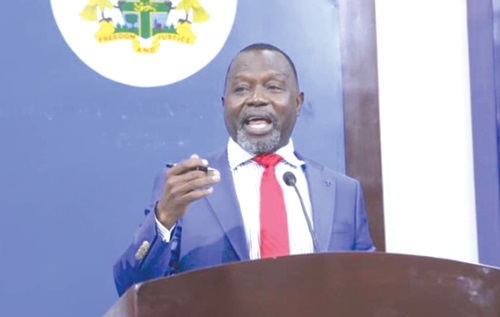On Wednesday, June 18, 2025, the Minister of Youth Development and Empowerment issued a statement to suspend the Central Management System (CMS) of the National Service Authority (NSA).
According to the statement to that effect, the authority’s CMS was suspended following a directive from the Office of the President as a result of the concerns about the digital infrastructure, that is, the Central Management System for postings.
This latest development raises concerns over the operations of the authority regarding its core mandate as stipulated in Sections 2 and 3 of the National Service Authority Act, 2024 (Act 1119), under the Objects and Functions of the authority.
This directive from the Presidency hasn’t come as a surprise, though, considering the response given by the Attorney-General to a question by a journalist during the press briefing on the matter, the former indicated that investigations were still ongoing and that if it became apparent that the system was to be audited, it would be done.
In January this year, I wrote an article and published it in the “Daily Graphic” about the alleged “ghost names” scandal that had affected the NSA, which was first brought to the public attention by the Media Foundation for West Africa (MFWA), publishers of the Fourth Estate.
The authority's management first denied the allegations, and the Board requested that the National Investigation Bureau (NIB) investigate the matter. This was after the management had successfully secured a court interlocutory injunction to prevent the Fourth Estate from publishing the report on the “ghost names” scandal at the NSA.
So, when a second attempt by the authority’s management to secure another court injunction on the Fourth Estate failed, questions were asked as to what was happening.
It was obvious, however, that the Attorney-General was going to take a keen interest in the case, especially when the Fourth Estate had submitted its report on the alleged “ghost names” scandal to the ORAL committee, which was set up by the President, in line with his resetting Ghana agenda.
Furthermore, it became clear that the President had shown much interest in the case when, on a couple of occasions, such as his first State of the Nation address to Parliament, he mentioned the alleged “ghost names” scandal at the NSA and indicated that those who would be found to have perpetrated the acts would not be allowed to go unpunished.
Findings
In furtherance of all of these, the Attorney-General at its recent press briefing announced a litany of findings from the investigations that the NIB had conducted on the matter.
As was expected, condemnations have been quick and loud from many Ghanaians even before the suspects are properly charged and put before a court. Could the public be blamed, considering the huge figures mentioned by the Attorney-General?
In my January article (referred to above), I mentioned the need to critically look at the operations of the CMS, which was under the absolute control of an external IT consultant.
Without prejudice, whatsoever, I did indicate that the CMS, under the absolute control of a consultant outside the authority’s internal IT was wrong and needed to be stopped. I did not, however, impugn any culpability on the part of the IT consultant in the alleged scandal.
Indeed, if concerns have been raised on the same matter by others, which have necessitated the latest action by the presidency, then I think that the time has come for the authority to do due diligence to ensure a more robust and impermeable IT system.
A question being asked is, Why should it take the presidency to suspend the CMS of an agency?
What was ordinarily expected was for the authority to have seen through this, as those concerns were genuinely being expressed by many, and stopped or suspended the CMS, even before the presidency could step in.
Sadly, this might now be seen as an indictment on the part of the NSA. Per the authority’s Act, the National Service Board, which also has oversight responsibilities for its modus operandi, should have been proactive in taking this action.
However, because the Board is fairly new and barely a month or two old since its inauguration, it may be partially excused, especially for the fact that perhaps, the members are yet to receive the full briefings on the activities of the authority vis-à-vis its mandate.
So, why do issues about the NSA receive much attention from many Ghanaians?
It is because of what many educated Ghanaian youths have gone through, and many more are still going through.
The question now is, what's next?
The writer is a former Director of Corporate Affairs at the NSA.
Email: ambroseentsiwah24@gmail.com

